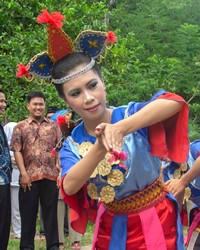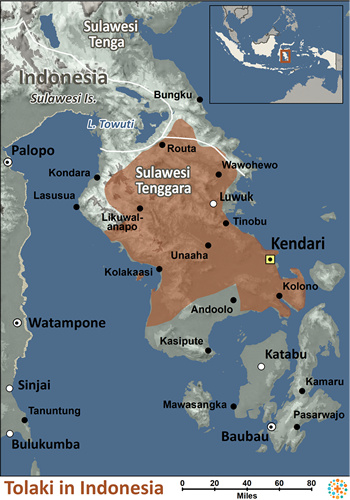The Tolaki live in several districts in the regencies of Kendari and Kolaka in the southeast province of Sulawesi. They make up one of the largest people groups in Southeast Sulawesi. Historically the two most important kingdoms were the Mekongga kingdom on the west coast and the Konawe kingdom in the east. The Tolaki language is part of a larger linguistic grouping called the Western Bungku-Tolaki subfamily. Within this subfamily, Tolaki is closely related to the Waru, Rahambuu and Kodeoha languages. Tolaki has two principal dialects, Konawe and Mekongga and several smaller dialects including Wiwirano, Asera and Laiwui.
The Tolaki are known for being very independent and having a simple lifestyle. Besides farming non-irrigated fields, the mainstay of this people group comes from the natural forest products found in the broad and varied Sulawesi forest in the region. Because of that, there is a phrase: "For the Tolaki, if you already have a house, sago and fish for the day, you've got enough!" In the developing city of Kendari, the identity of the Tolaki people group as the "man of the house" (the ones in charge) is still felt. The Lulo dance, which is a traditional Tolaki dance, highlights the unity and brotherhood which is easily felt in wedding celebrations or official ceremonies of area government. The physical appearance of the Tolaki is very similar to the Dayak in Kalimantan with white skin, slanted eyes and straight black hair. The Tolaki highly value peace and conflict avoidance which is illustrated in a rattan woven necklace called a kalosara. The kalosara with its lofty values and symbolic meaning, along with the gong and rice plant (which are symbols of wealth) have become iconic symbols of the city of Kendari and are seen throughout the region.
The Tolaki are Muslim, but traditional animistic beliefs are very much alive. They continue to perform several religious ceremonies that reflect their ancestral animistic worldview, for example, the monohu khau (cutting of the rice) ceremony. The Christian Tolaki have redeemed this ceremony to publically give thanks to God for a good harvest. Another ceremony (manahu udhan) is done in an open field for 3 nights in a row and is led by a dukun (shaman) which is also called a mbusehe (the name for a shaman in the local language). This is usually conducted in September, a night before and a night after the full moon. The only thing used to illuminate the proceedings is the light of the full moon. Then the attendees, usually Tolaki farmers, dance arm-in-arm around a makeshift structure that holds the drums and other musical instruments (a nilavaka). On the closing day, early in the morning, a ceremonial sacrifice of musehe is performed by the shaman. In addition, there is a ceremonial meal for seven days (meosambaki), as well as a mekui or mosere curu (cutting of hair for a seven-month-old baby), which is also called mee eni for children 15-year-old children.
The Tolaki who live in urban areas have an adequate standard of living. However, those living in the villages are isolated due to insufficient public transportation. Improved transportation infrastructure would help with the flow of goods and services into the remote Tolaki villages and improve their standard of living. It would also make it easier for people to take the message into their remote areas.
Pray for a spiritual hunger that will drive the Tolaki people to the only savior.
Pray for workers to go to them with the gospel.
Pray for Tolaki disciples who will make more disciples.
Scripture Prayers for the Tolaki in Indonesia.
IPN, 2011 Copyrighted © Used with permission
| Profile Source: Joshua Project |

























